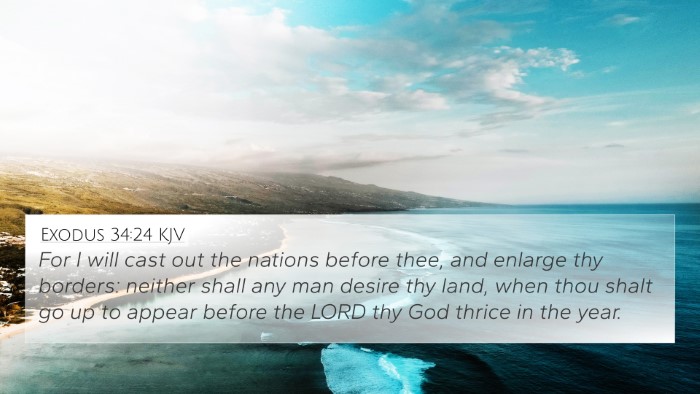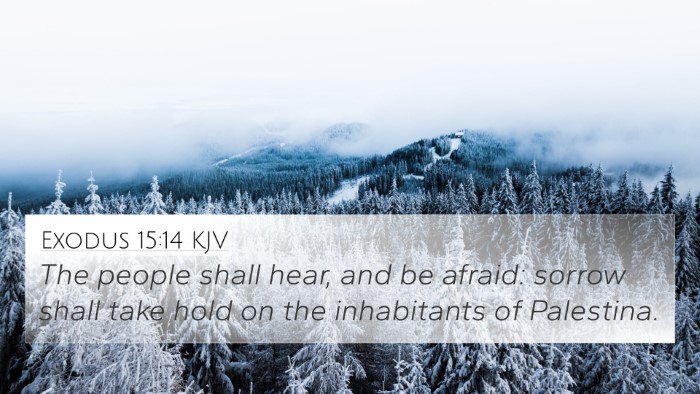Bible Verse Meaning of 2 Chronicles 17:10
2 Chronicles 17:10 states: "And the fear of the LORD fell upon all the kingdoms of the lands that were round about Judah, so that they made no war against Jehoshaphat." This verse highlights the divine favor and protection that God bestowed upon King Jehoshaphat's reign in Judah.
Contextual Overview
The Kingdom of Judah, during King Jehoshaphat's reign, experienced significant peace and stability. This period is marked by religious reform, military preparedness, and an emphasis on God's laws as a source of national strength. The verse indicates that neighboring kingdoms feared the might of Judah, leading to peace rather than conflict.
Analysis of Key Themes
- The Fear of God: This phrase means a reverential awe and respect for God's power and authority, which can influence nations and individuals in their decisions.
- Divine Protection: The fear that fell upon other kingdoms suggests a protective barrier around Judah due to its faithfulness to God.
- Impact of Righteous Leadership: Jehoshaphat’s actions led to this fear; he prioritized seeking God and encouraging the nation to follow Him, which resulted in favorable outcomes.
Commentary Insights
Matthew Henry: Henry emphasizes that Jehoshaphat's reign was blessed because of his dedication to God's laws. The surrounding nations' fear was a direct result of the fear of the Lord that He instilled, which kept them from aggression toward Judah.
Albert Barnes: Barnes notes that this fear implies not just respect but a recognition of God's support for Judah, making the nations mindful of the potential consequences of attacking them.
Adam Clarke: Clarke observes that this verse shows God’s hand of protection and the importance of national piety, as the fear of the Lord is paramount in rendering nations unable or unwilling to act against His people.
Connections to Other Bible Verses
The meaning of 2 Chronicles 17:10 can be enhanced by its connections with other related Bible verses:
- 1 Samuel 12:14: "If you will fear the LORD and serve him..."—indicating that the fear of God leads to blessings and protection.
- Psalms 111:10: "The fear of the LORD is the beginning of wisdom..."—showing that reverence for God leads to wise governance.
- 2 Chronicles 20:29: "And the fear of God was on all the kingdoms..."—further emphasizing how Judah's faith influenced neighboring nations.
- Proverbs 14:26: "In the fear of the LORD is strong confidence..."—highlighting the strength that comes from a good relationship with God.
- Isaiah 54:17: "No weapon that is formed against thee shall prosper..."—confirming the security provided by God to those who fear Him.
- Philippians 4:7: "And the peace of God, which passeth all understanding..."—the peace experienced by Judah under Jehoshaphat's rule reflects the divine peace described here.
- Luke 1:50: "And his mercy is on them that fear him..."—illustrating God's mercy in contrast to the fear felt by surrounding nations.
Inter-Biblical Dialogue
The inter-biblical dialogue surrounding 2 Chronicles 17:10 and its interpretations across various scripture highlights a consistent theme: God’s sovereignty and the benefits of righteous leadership rooted in the fear of God. Here are ways these scriptures connect:
- Theological Continuity: The thematic connections sown throughout the Old and New Testaments provide an understanding of God as protector and liberator.
- Literary Parallels: The stories of fear that resonate through scripture demonstrate a pattern where reverence for God led to tangible benefits for His followers.
- Historical Context: By studying the socio-political context of these passages, one can see the consistent impact of obeying God on national stability.
Practical Application
Understanding this verse and its implications can guide believers today on how to foster a community that respects and fears God. The call to piety and righteousness serves as a reminder that national and personal peace often derives from aligning with God’s principles.
Conclusion
2 Chronicles 17:10 illustrates the profound impact of faithfulness to God on a nation's welfare, showing that living in reverence can lead to divine protection and peace. Its connections to numerous biblical themes and verses serve as a framework for exploring how reverence for God yields blessings not only for individuals but also for entire nations.









